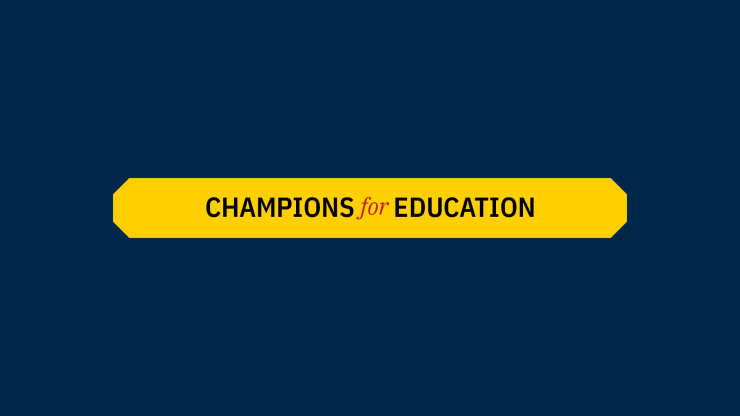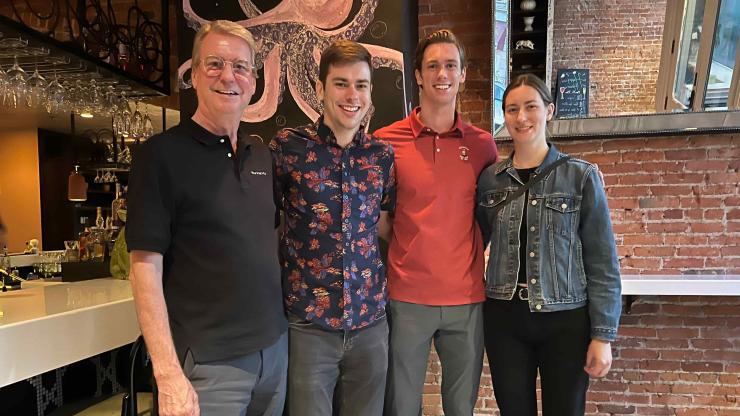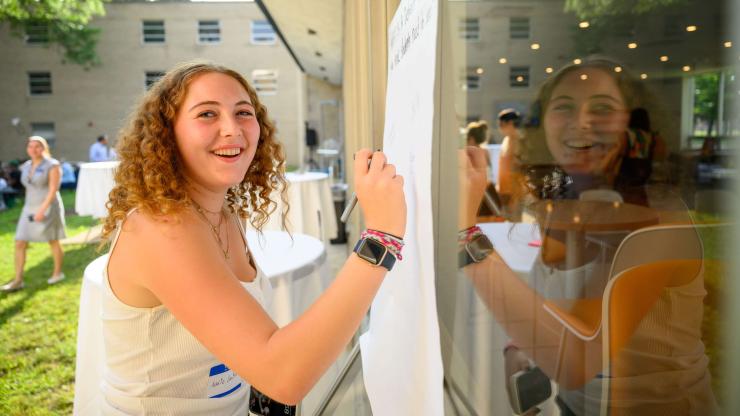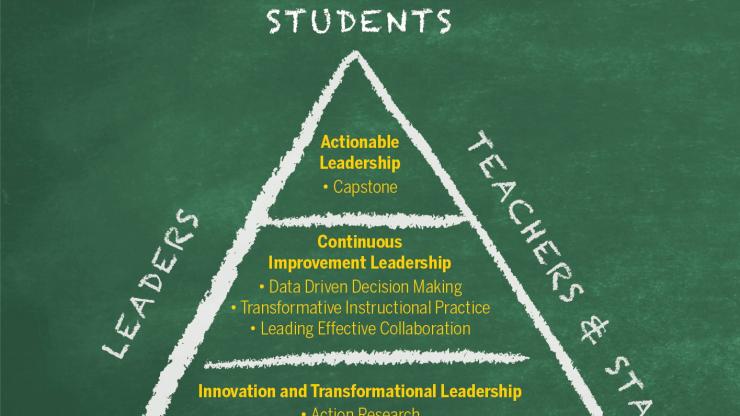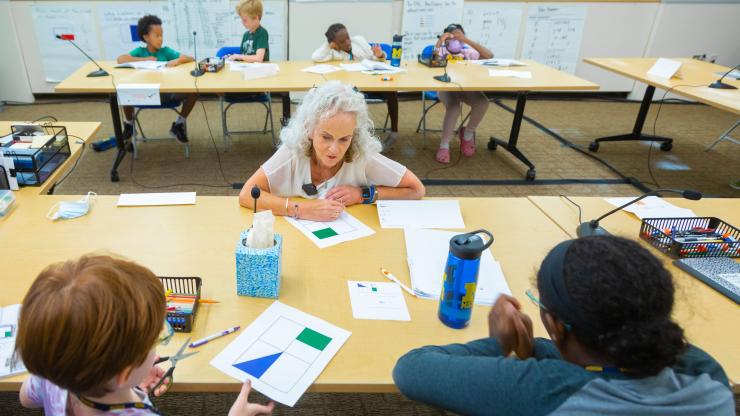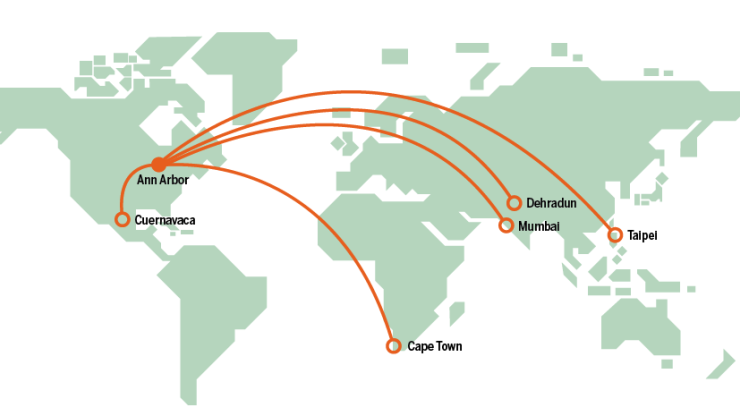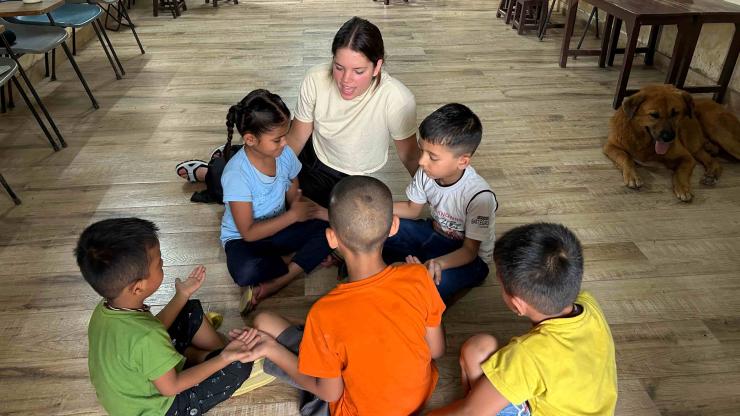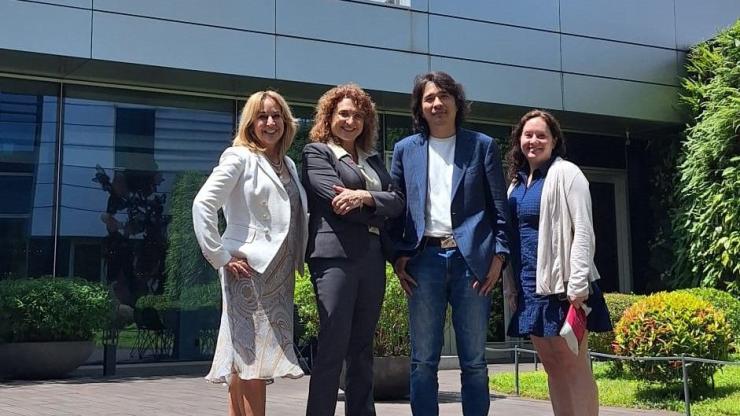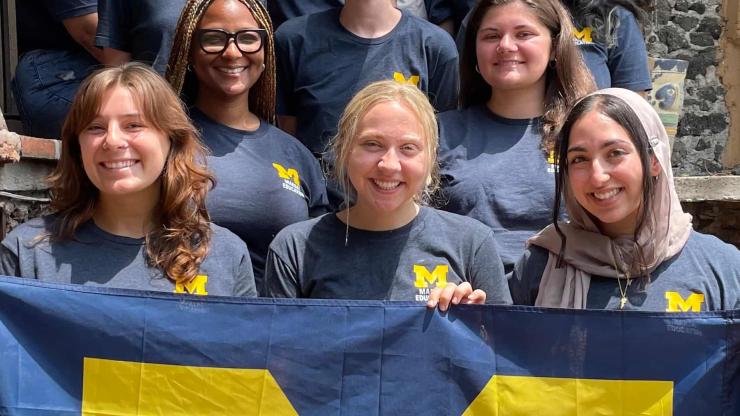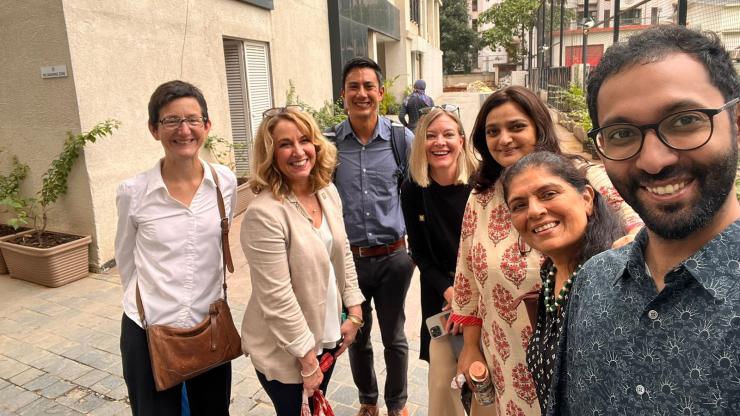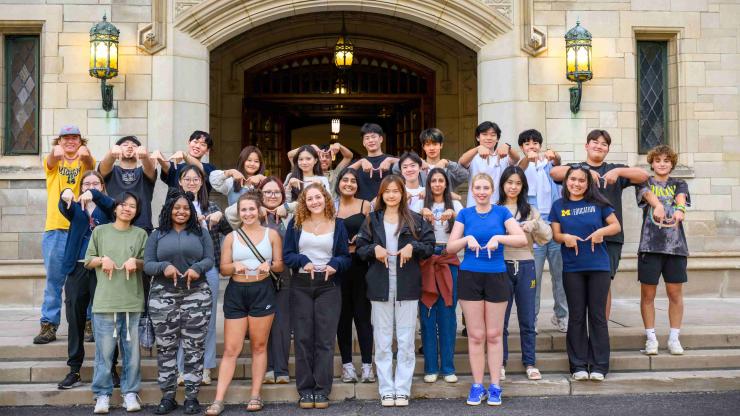South African Experiential Journey Delivers Professional and Cultural Enrichment for Higher Education Students
On visits to campuses and iconic sights, the cohort participated in intimate conversations with South African students, educators, and campus leaders
This article is part of a series, Making Connections Far and Away, Bringing Lessons Home
When graduate students in the Center for the Study of Higher and Postsecondary Education (CSHPE) traveled to South Africa last summer, it offered them a window into higher education and students' lives—and challenges—in another country. They soaked up sights and history and studied the impact of the apartheid system on South Africa's education system, culture, and communities.
"We explore some very serious issues during these study programs. Sometimes, what we encounter can be jarring or unsettling. I want students to be unsettled, but I also want them to come away having witnessed the resilience and indelible spirit of the local folks we are visiting," says Melinda Richardson, managing director of CSHPE, who oversees the annual experiential learning travel experiences.
Richardson says travel opportunities bring a lasting impact to Marsal students. "I want them to care and hope. I want them to come back to U-M changed by this experience. And, ultimately, I want them to take what they learned and make positive change happen."
During the summer of 2024, Richardson and Assistant Professor Charles H.F. Davis III co-led a group of 13 master's and doctoral students to South Africa. They visited campuses, took in iconic sights, and enjoyed intimate conversations with South African students, educators, and campus leaders. They also presented their research on first-year student experiences at an academic conference.
"It is a really special place because it has so many comparatives to U.S. higher education context," Richardson says. She took a previous group of students to South Africa in 2017.
CSHPE offers annual experiential study programs, typically alternating between international and domestic destinations. Students have recently traveled to Chile, England, and San Francisco, and next year's tour will visit New Mexico.
This year's South Africa group participated in a winter 2024 independent study seminar with Davis to prepare, including a deep dive into South Africa's history. Additionally, Davis helped the participants prepare for the South African National Resource Centre (SANRC) First-Year Experience. "We did readings about the apartheid system, how it affected the education system and the efforts made to transform and improve it in the post-apartheid world, and comparisons to the U.S. and Jim Crow, and experiences in this country," Davis says.
Davis had previously visited South Africa, but the Marsal School trip was his first experience in an academic and professional context. "I was excited to see what it looked like in contrast to everyday living I had experienced in South Africa and to get a better understanding contextually of how these institutions were different from one another and how they paralleled some of the structures we've seen in the U.S., given they too were a post-apartheid nation 30 years later than we were," he says.
The trip was chock-full of academic, historical, and cultural exchanges. The group visited important historical sites, including the National Apartheid Museum; Robben Island, a notorious prison where Nelson Mandela and other political prisoners were held; and the District Six Museum, which chronicles the history of a district of Cape Town that was formerly racially mixed until Black residents were forcibly resettled during apartheid.
Students visited four South African universities, including the University of Cape Town, the University of the Western Cape, Nelson Mandela University (George campus), and the University of the Witwatersrand in Johannesburg (also known as Wits). During these visits, they met South African students, gaining insight into the country's institutions and the impacts of racial and socioeconomic inequities.
"It was great as an educator to see the enlightenment and experiences that our students were having, none of whom had been to South Africa before and many of whom were Black students who had never been to the continent," Davis notes. "There was amazing work happening all over the country."
The SANRC academic conference was a centerpiece of the trip. For many, it was their first time meeting other scholars at an academic conference. Marsal students presented their research, took in colleagues' presentations, and met academics from around South Africa and other countries.
"Our students worked hard and did a masterful job holding the room to speak about first-year experience in the U.S. context, attended sessions, and engaged with practitioners during lunch and social hours," Davis recalls.
He adds: "There was a particular awakening to put their feet on the motherland and find parts of themselves through these cultural practices, whether the places we ate, the dances we learned, the conversations we had, and the shared experience across the diaspora. That was really tremendous."
Richardson applauds the Marsal students for delivering strong presentations and capably fielding questions. "This is thanks to the knowledge and classroom experiences U-M students receive as part of their educational preparation," she notes.
While academic insights and contextualization provided the backbone of the trip, Richardson said visiting tourist attractions and having fun are essential to successful travel.
She prioritizes leaving city centers, and instead visiting towns and villages and meeting locals. In Langa Township, the group stopped for lunch at Mzansi, a family-owned and -operated restaurant.
"By the end of our time at the restaurant (which is actually someone's house), students were playing musical instruments and literally dancing in the street," she says. "My favorite moments are those when students simply get to share space with our local hosts and fellow students."
Far from the classroom, the group visited the Gondwana Game Reserve and, during two game drives, learned the distinctions between public and privately operated reserves and the role these entities play in the South African economy, the conservation of native habitats, and preservation of endangered species. In Cape Town, they journeyed to the top of the famed Table Mountain on an aerial tram and shopped for souvenirs in Greenmarket Square.
As she designed the trip, Richardson leaned into past experiences, local contacts, and Marsal alums. She had invited South African student organizers to collaborate virtually on Marsal BLM Week of Action programming in 2020. Also, the 2017 trip inspired some of the 2024 group's activities. For instance, on the first visit, Richardson met Vusi Mchunu, a then-student protester who served on a panel during the group's visit to the University of Witwatersrand. She stayed in touch, and Vusi, now a teacher outside of Johannesburg, offered to guide the group on its final day.
"It was a special full-circle moment for me to watch Vusi—a young, proactive South African education professional—help a new group of U-M students contextualize their visit to Soweto, Yeoville, and the Apartheid and Hector Pierson museums," Richardson says.
Whenever possible, she taps into Marsal's vast alumni network worldwide. "Any time I can engage alumni, it enriches the experience so much more," she says. That connection led the 2024 group to the George Campus of Nelson Mandela University. The campus principal, Kaluke Mawila (PhD '09), earned her doctorate in higher education at Marsal. She warmly welcomed two Marsal student groups to South Africa. In 2017, she shared research initiatives in South Africa with the group and hosted this year's group at the George Campus.
Mawila helped organize a day of learning with George Campus leaders, faculty, and students. Several Marsal students and faculty participated in panels on critical topics, such as student debt, student life, and effectively leading multi-campuses. Richardson said these issues resonate with both U.S. and South African students.
"She knocked it out of the park," Richardson says of Mawila. "She leveraged the day so that our being there helped her campus, and we had to bring something to the table. It was very reciprocal."
On that visit to the George Campus, Marsal student Raul Gamez shared insights on multi-campus management when George students started asking George administrators questions about student debt, fees, and protections for LGBTQ+ students. Gamez said he learned that it is unusual for South African students to have access to their school leaders, and the gathering presented a rare opportunity.
"That was very brave of the students, and it was a clear display of student advocacy and activism," said Gamez, a higher education doctoral student with an organizational behavior and management concentration. "They were not going to miss opportunities to ask the administration about their needs, which was very powerful for me."
Gamez and other CSHPE students documented their experiences on a blog, sharing rich details of their daily adventures and impressions.
Master's student Dani Williams wrote about the group's visit to the Apartheid Museum. Williams says she joined the trip to connect with South African students and learn about another higher education system, and the experience exceeded her expectations.
"Table Mountain was incredible. Connecting with NMU students was a special treat. The presentations at UCT were great. The Apartheid Museum was sobering and eye-opening," says Williams, who is concentrating on diversity and social justice in higher education.
Williams is exploring options to continue her studies as a graduate student at Wits or the University of Cape Town.
"I am interested in learning about the experiences of Black, trans students on these campuses and if there are parallels across national borders," she says.
That curiosity and inquisitiveness is precisely why Richardson hopes more students participate in Marsal's experiential learning opportunities.
"There are so many wonderful things that a classroom education can offer but applying that learning and challenging your own personal assumptions by engaging with others in a real space is truly a unique opportunity," she says. "It prepares them to be better higher education professionals—more compassionate administrators, more critical researchers, more thoughtful faculty."



